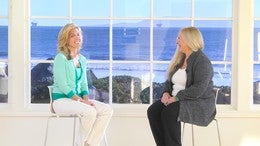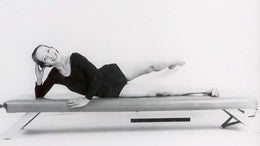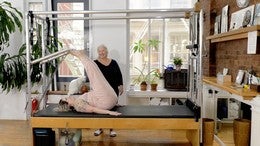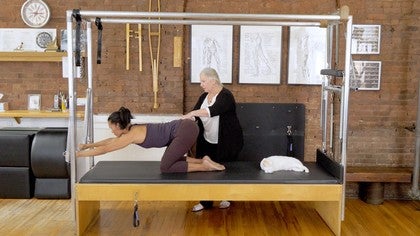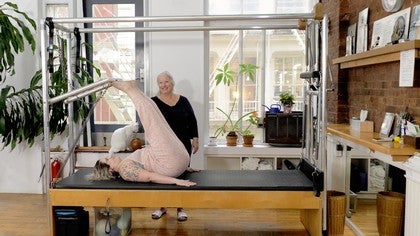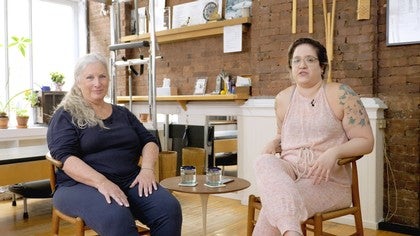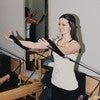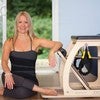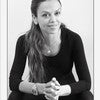Read Full Transcript
Chapter 1
Introduction
Hi, my name is Angela Meiburg and I'm here to interview Debra Lessen at Green Street studios here in Soho and New York City. Uh, I've been asked to interview her today because I've been, I would say maybe stalking her a little bit, um, in an obsessive way, trying to get answers to some questions. I can't seem to find answers to those being that we'll get into soon. But being about the polarities industry, what are we doing? What is our role as bodies, teachers, what is the problem with polarities and why are we sometimes at odds with one another?
Why are we sometimes confused as to what our job is and what can we do in order to find a better dialogue between pilates instructors from different lineages and make the new generation a little bit less confused as to what they're supposed to do? Who are they supposed to ask these questions of? And, uh, how they can maybe make some pilgrimages to maybe older, more veteran instructors who could enlighten them as to the history of [inaudible], the history of how we got to this place and why that matters. So Deborah, hello. Good afternoon. Thank you for having us today. My pleasure. How are you feeling about that intro? Um, that's a big intro for a vital topic. Uh, would you consider yourself a classical pilates instructor if you believe in that kind of title? I absolutely do. Consider myself classical in, in the definition of the word classical. It's not a self, uh, in a self appointed title. Um, classical to me means the discipline that I learned from my mentor who was trained by Joe.
Not that one has to have a mentor that was trained by Joe, but we have to know what our roots are. We have to know how and why this method developed. And if we're in sync with that or not to call ourselves a [inaudible] teacher would could you say, and um, cause I think people need to do their homework a little bit. So I don't want you to sort of get into too much detail about this, but if you could say in like a few short sentences, who was your mentor and who else did she also mentor? Um, I was trained by Corolla treer a Corolla, worked with Joe for 10 years in the 1950s approximately that decade.
Um, she was absolutely dedicated to the work and to him and Clara and um, there were many other teachers at the studio over a period of 35 years or so. Um, some of whom are interviewed for the legacy project. And I absolutely recommend that you watch those interviews. Um, the people that you would be more familiar with now are Jillian Hessel. Um, Roberta Kirschenbaum who was the, the last, she was kind of the tables here in New York. Yeah, the, the tail end of the stream of teachers.
Uh, that's great. I just wanted to give people some context and some understanding as to like who are some of the sources they could potentially seek out about Debra's heritage. So back to the seaward, the classical word, I think it might've been at some point in the history of Pele's confused somewhere along the line as to what that means cause what that means to you and what that means to someone else. Could Be v like vastly different. And my understanding from where I came from, uh, was at classical met Romana and everything else was something else.
Does that sound true to you? It sounds familiar to me. I don't accept that. Um, there's history to disprove that, but rather than, uh, stir that pot, I just like to give a similar illustration, uh, because I came from the gram world and um, Martha Graham's technique evolved over a very long period of time and there were teachers at different periods of time who learned things differently from her was one Graham technique and the other not, I don't think so. There's an evolution there. And also there were different bodies that that technique went on that had to adapt because their hips weren't flexible enough, their back wasn't flexible enough. And so if you, if you look at the overarching history of the technique, it's very clear what the, what the technique is maybe not exactly how you do each exercise. And so to judge each other on that sort of basis is really silly.
Chapter 2
What is Our Job?
What is this job?
And it's so open ended and so nebulous of a question. But it's also the only question I can come up with as a sense of desperation as a new teacher. Um, and I call myself a baby teacher in terms of the only the sheer amount of years that I've been teaching is not enough to be considered anything above like maybe like the baby part of your evolution as a teacher. And then I'm thinking, what is my job? If my job is going by a sequence, is my job teaching people how to be better at Palladio's? Is My job teaching people to move? Well? Like what is it?
Okay, well we have to jump, just jump in somewhere. Um, but of course we could jump in from any, from anywhere into this, this big sphere of fabulous goo. Um, first I would like to say that the PyLadies method is a, um, deliberative road to self knowledge, both mental and physical because they are married and it's a practice. And, um, one of the problems I see in the advent of teacher training is that people have not developed their own practice before they embark on teacher training and don't really understand how essential that is to what, uh, to transmitting that to another person. [inaudible] what are they transmitting to another person in the sense that is helpful to them feeling, understanding, embodying, controlling, maintaining their own health. And the f the exercise part of that are these exercises that we've all learned, but it's, they're not, they're a means to an end.
And that is our vehicle to health. Well, part of it, if you read return to life, exercise is part of it. Fresh air, good nutrition, cleanliness, blah, blah, blah, blah. Um, and so I feel that it's part of a [inaudible] teacher's job to help coach people, um, that they may have bad sleep habits that are, are causing problems in their physical being. They may not be supporting themselves with nutrition. They might may not be drinking enough water, whatever it is.
Um, and that's within our scope of practice, whereas I'm diagnosing them or prescribing even vitamins is not within our scope of practice. I don't know of a teacher training program that does half of what you just said it should do. I'm sorry. Got No but like that's factually um, based on like what I think I understand about like the bigger teacher training programs is that no one is giving anybody any unsolicited information about their nutrition, their health, their water intake and uh, how much fresh air they should get it. So I just want to be clear on that. Um, I would never presume to tell people what to eat, but I can maybe tell from their power or their energy, yes. That they're deficient. And then I would suggest that they might check out seeing that kind of professional needs days. That sounds rebellious almost.
That sounds very much against what most teacher training programs are trying to do. And I don't know why. And I don't know if one is better than the other or you know what I mean? What, like what teacher training programs are trying to do and what you're saying is better or important or less important. But I would say that what most of the people, my generation of teachers are learning is two ends of the C of a, of a spectrum, which is either how to teach the exercises in what we call an authentic way. And I put authentic in quotes because I don't know exactly what that means. And what we do is progressive teachers, which is to look at the body and try and teach the body in front of you exercises that are either therapeutic, rehabilitative, um, and that it goes under the sort of modern Palladio's umbrella.
And then those two things are so vastly for removed from one another and they, that they almost don't speak the same language anymore and they both want to be under the umbrella of Palazzo these and they don't know how to reconcile. There are two points of view. Um, that's not really a question. It's okay. But if I may comment that to me they have to reconcile because, because it's all of that, it's all of that. Um, the, the exercises again are a vehicle, but we're looking at a whole person. We're not just looking at how they perform a prescribed exercise.
Now if you have a body that that comes into your studio that's unable to do the regular repertoire, what do you do? Do you say, I'm sorry, I got their repertoire. I can't work with you. But what's the regular repertoire? Um, coordination hundred Jackknife. Sure. But then in the, in the Times that I've been here, uh, you've never taught me the hundred in the way it was authentically taught. Not once. Okay. Well let's not use that word authentic because that's another, a self described. Yeah. I would love to use a different word. Okay. Well, when I studied with Corolla, when I was her client, she introduced me to the hundred in my first session.
First she, uh, told me the breathing and she put her hands under my shoulder blades and had me breathe into her hands with my spine and flection. And then she described the a hundred and you just did it. So she was giving definitely some information on the physicality of that exercise. One can't embody that like that. It takes con body conditioning to do that.
Now the way that I have come to work, and I taught dance for a long time before pull Audis. So my instinct is always to to break down and make sure that all of the parts are working and then put them back together. So I want to see that the spine is in the right position. I want to see that the breath is functioning, that the abdominals are actually working before putting the load of the legs out because a brand new client in variably is not going to be able to get into that position and maintain it. So there's the advent of pre Paul Audis, which you teach often. Yeah.
There's the Kathy grant before the hundred repertoire there is all this stuff that leads you up to be able to do the hundred right. Why is it not common to say out loud in a studio the hundred as it was prescribed originally, let's say less than authentically, not a beginner exercise. Why is that so hard to say? It should not be hard to say. It should not be hard to say. But if you look at old films of um, non-teachers doing PyLadies, their forum was not good but they were doing it. Um, they were doing it but they weren't doing it well. Now if you were a, an athlete or a dancer and you kept doing things with not great technique over time, you would hurt yourself. For sure.
We are supposed to as plots teachers be replacing poor movement habits with good movement habits. And I think that's the point. Like if we leave this conversation with nothing else, I would say that that's the most important point that I would like to make people at home understand that like your job is open ended in the sense that you're here to facilitate better movies versus poor movement habits at whatever that means. And not, not to be offensive to anyone, but like,
Chapter 3
Learning How to Use the Tools
like I think that there's a school of thought, which is I'll do what I want, I know how these springs work and then I'll do what I think my student needs or wants or what will be the most burning exercise or what will feel like they get them results or whatever. And then I'm kind of like, but do you know what you're abstracting, you know? Um, and, and how do we like get them back to being curious about what they're abstracting. I want to just turn the crystal ball around for a minute.
I want teachers to start with how do I want my body to feel after I've done my Palabra session and then work backwards. Now everyone is not going to do this. But I think that your basic training, you know, whatever certificate program you went through is just given you a bunch of tools. You then have to go out on your own and learn those tools. You have to digest them.
You have to be able to spit them out on the spot in lots of different situations with lots of different bodies, and then plus you have to embody it yourself. Then maybe you can start manipulating a little a little bit more. It goes back to your thought about if you don't have a practice, then it's very hard to teach a practice. Absolutely, and I think that that's so key to all of this discussion because I think that is somewhere along the line for some has gotten lost and if we don't emphasize this in his interview enough, then we're doing some kind of disservice because it's, it's something that I think we're both very passionate about coming at it from very different backgrounds. Let's assume a, because there are many teacher training programs that every teacher training program has its strengths and its weaknesses, which means that all students who graduate from these programs have to make it their business beyond that program to get a better sense of the world. Just like you graduate from high school and you'd go to Europe for the summer or Grad school. Yeah. Now, it doesn't mean that you have to embrace everything that you're exposed to, but just to be able to get perspective on what you learned in your basic training, then you have to get to know yourself and start developing your own skills as a teacher before you start lopping on all kinds of new stuff that may or may not be pertinent to the goal.
Right. That is 100%. The reason why I asked you a few months ago a question about Kelly Kane who is definitely what you just said, an outlier of the plotters industry because first of all, her school is called the canes school for core integration. So the word Pilati is, isn't even mentioned in the name of the school and you leave there, um, with this amazing education about rehabilitative post physical therapy, what do you do with a student who is maybe has a neurological condition pre postpartum, blah, blah, blah. Right? I left that program knowing 0.0 information about a sequence, um, uh, beginner, intermediate, advanced levels of teaching, uh, that there was an order according to someone. Okay. Yeah. Um, and I had to go learn those things on my own. Right. Cause cause the, the school that I went to did one thing really, really well and then didn't do other things. So I had to get continuing education.
I'm suggesting yes, that every program is going to have its black holes and its strengths. Now what you learned in Kelly's program is very valuable. Absolutely. Yeah. At least now you know what blanks you want to fill in. Um, but this is going to be vastly different for everyone. And if, if we could actually speak to people before they enroll in a program, they need to go take sessions with a number of different schools and, and see what kind of teacher they are hoping to be.
When I think of authentic, which I think, you know, sounds like a bad word these days feels like a bad word to me. Um, or classical cause I think that the uh, like uh, classical instructors decided at some point that they don't like that term and kind of moved to authentic at some point. And I think that both of those words basically mean working on a specific equipment, maybe mostly grots working on a specific spring tension, working in a specific order, working in specific settings and levels that are not negotiable. Where you, you sit, where you sit for stomach massage, you push what you push for rowing. You can't do it. You just are not maybe ready to do it.
Well, there's no modifying. Yeah. Um, or very little modifying. That's, that's definitely one end of the spectrum. But I can tell you at Corolla studio there was never any mention of levels because people learn like this. So just because someone is intermediate doesn't mean that they do every intermediate exercise. And then what about all the people that a hundred percent disagree with this? Well, you know what? They have to find a way like I want, I want a good lot liner for.
But what I'm doing is also part of this history of this movement because I am not teaching the intermediate in your definition of the intermediate, I'm teaching it in my definition where I was taught under you, under so-and-so, under this other person. Like, I need the validation to keep going. Otherwise I need to call what I'm doing. Something else. Okay. Well, just from, from the teacher's point of view, each individual body that comes into your vision has to start somewhere and you want to take them as far in conditioning their body as they can. Right? But their paths may be very different from the next body's path. And this is why they didn't teach classes in the old days they taught the body.
Um, I don't think of anything in terms of levels. As a matter of fact, you know, in the last 10 or 15 years when I hear things like, um, that Romana thought round back on the short box, which we called stomach control, is a beginner exercise. I totally beg to differ. Beginners can't do that exercise. That's an opinion. Do you know that? But that's an opinion that is valid and is based on your working with your bodies and your personal body for almost 40 years. Why is having an opinion a problem bloom overall?
Like why does that stir up so much emotion and atomicity city w like, you know what? I mean like, like it just has to be like we have to at some point, uh, politely agree to disagree and still teach people really great movement on what we think [inaudible] is. Because what you think [inaudible] is, is not the same as the studio next door. Correct. And you know what, to a certain extent, that's fine. That's fine. Um, but there's no, you know, young first of all, young teachers are insecure for sure because they don't have a lot of experience. There are some, probably the majority of teachers will not be introspective about their own development as a teacher. To me teaching Palabra these is the profession. The profession is not spitting back exercises. This is, this is what are your chops to take this beginner and get them to an intervene intermediate or advanced level in the most direct, efficient route where they learn how to control their own body.
Chapter 4
Judgements in the Industry
So if I choose path a and the studio next to me, the classical authentic studio chooses path B, I am invisible to them. And that is partially what I need from you to say to people who are maybe on like a little bit more in like my end of the pool, right? We're like, we're not invisible. Whoa. No, you're not invisible. You're not invisible and don't be intimidated by those people.
It's hard to feel invisible with people in your own perfection. It is, but you know there are that you don't matter. There are other facets of, of being in a profession, and I'll give you another example. There are some very intuitive, fabulous, hardworking teachers and studio owners that are very intimidated that other people are out there doing videos and doing star and twist and looking perfect and you know, they're getting lots of attention and these hardworking people aren't. And I just think you know what? This is a problem of the young.
It is because when you, when you grow in your career and you learn who you are from really applying yourself, none of that matters anymore. It does only in the fact that if I post a picture of myself on social media, which we said we weren't getting into, but we're into it anyway. Um, so, so, and I am doing a variation on a variation on a variation, having done my homework and have decided that this is something I'd like to put out into the world as something I'm noodling around with, with my thoughts and my way of communicating in my generation is social media. I will get of percentage of comments that are, this isn't right. Real polarities. Okay. So you know what we could, we could discuss this till the cows come home, but I think this is more about the state of the world, the generation, the [inaudible] so insecure about my question to you.
I think I know what are they were told they were indoctrinated that what they learned is Halati. So what does it absolutely, what does it matter to them? What I do? What am I going to steal your students with? What are you holding on tight to? I, you know what? I understand the dilemma here. It's not just about politeness. Okay.
What is it about? It's about people that studied at School of American ballet as opposed to the Joffrey. It's in every, it's in every walk of life. Sure. It's, you know, my church is better than your church, so it goes back to a, my, my walker lawn is greener than your lawn Israelis and Palestinians. Yeah. We can't solve it. I only say that as an Israeli.
Chapter 5
Taking a Position
It's when you start defining it, that people get really uptight. Right. And they feel like they have to take a position right to and or, no. What do you, what like in the pilot is you take up position and what is your goal? You took up, let's say I took a position, I'm a progressive teacher. Whatever I do is going to be haves, going to have a Bosu on it no matter what.
Well, you know what I mean? I took a position. Yeah. Then my comment to that is why do you don't take a position? You don't need to. You just be you. You're on your road, you develop yourself and the best advice that I could give you as a teacher is every day that you go into the studio, you bring your full intellect, animal self, your emotions, your instinct and you try to do your craft better. Now we may disagree on what that craft is, but judging each other is a waste of time and energy. It just gets everybody upset and spins wheels and I would venture to say that for your health and welfare, just navigate away from people that are judgmental.
It'll just pull you down. Why can't we be like scientists and just be like, I'm having an intellectual discussion with you. What you are saying isn't garbage just because I disagree like that is not the the zero place we are coming from when we're having intellectual discussions. You know what I mean? Like like the, the discussion starts with well I know more science. Well I know more classical and it's like sure, but why can't that be interesting versus combative and that's what I want people to hear today and say have these discussions.
That's what's going to keep things lively and going and inspiring and interesting because agreeing to disagree or just disagreeing is fascinating. Why does it have to be so emotional? It is what I think. Debra, you're welcome. You're welcome Debora 40 years. And I just say go welcome.
Chapter 6
Making Changes
Um, you know, it's been a particular challenge for me because, um, during the lawsuit years I, that I felt the full force. Oh, beautiful. Great. Of the other side. Yeah. Um, but the reason that I chose to fight back is wait a minute, I studied PyLadies turns out I worked for corona out. Um, I'm not chopped liver and you guys may call yourself New York PyLadies but I live in New York. Right. And I teach [inaudible]. Right. Does that make you New York [inaudible] or any of these other labels?
And you know what, I like a lot of these teachers, I might with a lot of these teachers and when we're in the studio actually doing this stuff, we all realize how the same, it really is. That is lost and needs to be found. Because if you put me in the studio with my like, you know, cohort from a different whatever school of thought, we would be teaching the best. We know how with the most passion we have to the student in front of us to the same end, which is please leave here feeling better what we taught them, what exercises, what order doesn't. At the end of the day matter that much.
We're using the same tools to teach them how to leave here feeling better, how to move better, how to fall down better, how to get up better, how to fall down. Well you know all these interesting primal tools but that doesn't get like, that's not like sitting on the forefront of the dialogue and I'm trying to say can we bring that to the front of the line and everything else can maybe like melt away a little bit. You know like can we calm down about the minutiae of what we're doing and remember that we're all trying to just make people feel better. Well, I suggest that everyone has an experience at the pilates method alliance conference where we're all in a learning situation together. Um, it is, uh, uh, love first of its own sort. And, um, you know, change happens very, very slowly and this is a very long, um, education to get people to come to a common understanding.
But we achieved this in establishing the basis for the PMA certification exam. There were people from every SAS it of the [inaudible] industry and we all expected to be wrestling each other to the ground. And in fact, we immediately identified what we had in common, which was almost everything. Right? That's the point. And then what's the original question that I came in here s a few months ago and I, you know, I sat here for about three hours asking the same question over and over again, which was, what's the problem? That's the problem.
The problem is that we're not agreeing that we're doing the same thing is if there's someone doing something totally else there isn't, there isn't. Um, and that it's, I'm still shocked when somebody is accusing someone else of doing something totally else. They're not, they're teaching the same stuff, different flavor. Are you crazy? And that there are other, um, guidelines that are pertinent to everyone. Um, what is the makeup of a session so that it doesn't go too far toward the medical model? It doesn't go too far toward a straight fitness model. Someone just told me that, you know, they do a sets of pull-ups on the trap table this way, in this way. And I think, well that's great. Yeah, it's not pull ATI's.
Right? But you want to do that great. But you shouldn't be doing more than five or 10 minutes of an hour session check doing stuff like that or a year you starting to change the color of what that session is. And there are gradations within the colors. Uh, and you don't always know when you're veering off the pallet, but this, this is where your, the challenge to each individual teacher comes in, that you are watching yourself through the mirror of the bodies that you're training. Now very early on, um, after I left Corollas, I primarily worked with dancers. They all came in with, with just, uh, an unbelievable overdevelopment in their upper thighs.
And I thought that I figured out why that was happening and I had to, I felt like I was changing my idea of PyLadies in order to get more balanced muscle development for these people. And it turned out that, you know, I was hooking into something that was happening in the universe because other people were also doing that. I just didn't know until several years later. Um, those kinds of changes are very slow, very slow. Uh, let me go back to Ron Fletcher for a minute. Always. Um, Ron was incense that people don't, that don't have a particular talent for teaching piles were becoming Palabra these teachers. But this is what happens when something goes onto the open market. Ultimately the market takes care of itself and not every client is going to be comfortable with every kind of teacher. People have to kind of find, um, their sweet spot at the right place. And maybe after 10 years they've got to go somewhere else.
So, you know, there's, there's room for a lot of variety. There's no one way. I couldn't agree more. And I think that's a great place to thank you for saying all this stuff and letting me rant at your face. Um, because there is no one way, there is no one body, there is no one way of thinking and the way you think changes over time. And so even if there is one way you can't, there's no way you can be that one way for 40 years. That is impossible.
Your DNA changes. You do something else. Uh, and I want to encourage everybody that maybe kind of stuck around and listen to this to not be one way and not only think one way. And please come visit Debra studio if you can, uh, and ask her some of this stuff yourself or just come and move this. Not One way. Thank you.
